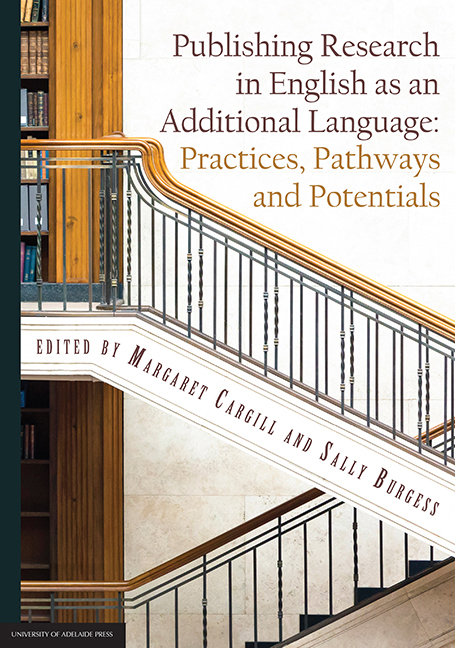Book contents
- Frontmatter
- Contents
- List of contributors
- Acknowledgements
- Foreword
- Introduction: Unpacking English for Research Publication Purposes [ERPP] and the intersecting roles of those who research, teach and edit it
- 1 Accept or contest: A life-history study of humanities scholars’ responses to research publication policies in Spain
- 2 Introducing research rigour in the social sciences: Transcultural strategies for teaching ERPP writing, research design, and resistance to epistemic erasure
- 3 Blurring the boundaries: Academic advising, authors’ editing and translation in a graduate degree program
- 4 The delicate art of commenting: Exploring different approaches to editing and their implications for the author-editor relationship
- 5 The CCC Model (Correspondence, Consistency, Correctness): How effective is it in enabling and assessing change in text-editing knowledge and skills in a blended-learning postgraduate course?
- 6 How credible are open access emerging journals? A situational analysis in the humanities
- 7 Disseminating research internationally: Intra-subdisciplinary rhetorical structure variation in immunity and allergy research articles
- 8 Scientists publishing research in English from Indonesia: Analysing outcomes of a training intervention to inform institutional action
- 9 ‘The one who is out of the ordinary shall win’: Research supervision towards publication in a Chinese hospital
- 10 The geopolitics of academic plagiarism
- 11 Training ‘clerks of the [global] empire’ for 21st-century Asia? English for Research Purposes (ERP) in Vietnam
- 12 Standardisation and its discontents
- Reflections and future directions in publishing research in English as an Additional Language: An afterword
5 - The CCC Model (Correspondence, Consistency, Correctness): How effective is it in enabling and assessing change in text-editing knowledge and skills in a blended-learning postgraduate course?
Published online by Cambridge University Press: 16 March 2018
- Frontmatter
- Contents
- List of contributors
- Acknowledgements
- Foreword
- Introduction: Unpacking English for Research Publication Purposes [ERPP] and the intersecting roles of those who research, teach and edit it
- 1 Accept or contest: A life-history study of humanities scholars’ responses to research publication policies in Spain
- 2 Introducing research rigour in the social sciences: Transcultural strategies for teaching ERPP writing, research design, and resistance to epistemic erasure
- 3 Blurring the boundaries: Academic advising, authors’ editing and translation in a graduate degree program
- 4 The delicate art of commenting: Exploring different approaches to editing and their implications for the author-editor relationship
- 5 The CCC Model (Correspondence, Consistency, Correctness): How effective is it in enabling and assessing change in text-editing knowledge and skills in a blended-learning postgraduate course?
- 6 How credible are open access emerging journals? A situational analysis in the humanities
- 7 Disseminating research internationally: Intra-subdisciplinary rhetorical structure variation in immunity and allergy research articles
- 8 Scientists publishing research in English from Indonesia: Analysing outcomes of a training intervention to inform institutional action
- 9 ‘The one who is out of the ordinary shall win’: Research supervision towards publication in a Chinese hospital
- 10 The geopolitics of academic plagiarism
- 11 Training ‘clerks of the [global] empire’ for 21st-century Asia? English for Research Purposes (ERP) in Vietnam
- 12 Standardisation and its discontents
- Reflections and future directions in publishing research in English as an Additional Language: An afterword
Summary
Introduction
A growing need for text editors worldwide has been created by the increasing importance of English as the lingua franca of academic and scientific publishing, combined with growing pressure in these communities to ‘publish or perish’ in English as a foreign or second language (Hvistendahl, 2015) and a greater number of students who lack academic writing skills. An allied problem that places an additional burden on text editors is the failure of academic supervisors of postgraduate researchers to intervene appropriately when their wards display an inability to express themselves clearly or correctly in their writing (Cadman & Cargill, 2007), or even an unwillingness to do so. A recent informal survey of eight online sites addressing the training of academic supervisors to cater better to doctoral researchers’ needs revealed that only one refers the skill of writing as being something supervisors should be trained in (European University Association, 2006). Typical of most of this batch, one states vaguely that ‘[t]hesis supervisors will have regular consultations with their doctoral students about the progress of their thesis work’ (Max Planck Institutes, n.d.) — which is more about process than product, it would seem. Another stipulates, without any mention of actual writing or editing skills, that ‘[s]upervisors should carefully review the submitted materials and identify weaknesses in the argumentation. This allows doctoral candidates to address problems as they arise’ (Freie Universitat Berlin, 2014). An exception is the Universite catholique de Louvain's Graduate School of Management Research Institute, which specifically mentions editing as ‘one of the research training activities … that support the individual research work that the thesis constitutes’ (2011). Brabazon (2013), a doctoral-student-turned-supervisor as a professor of education in Australia, asserts that not reading a candidate's writing is one of the characteristics of the worst supervisors; she herself begins 10 interactive editing cycles with a candidate when their first draft is complete (2010). Finally, a chapter on ‘encouraging early writing and giving feedback’ in a handbook for doctoral supervisors focuses entirely on process to the neglect of actual writing or editing skills (Taylor & Beasley, 2005).
- Type
- Chapter
- Information
- Publishing Research in English as an Additional LanguagePractices, Pathways and Potentials, pp. 87 - 120Publisher: The University of Adelaide PressPrint publication year: 2017

